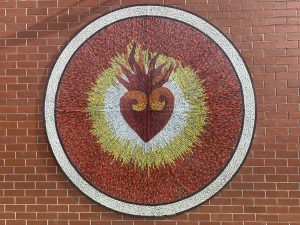Religious Education is at the centre of both the formal and informal Catholic school curriculum. The Curriculum sits within the context of the Education Framework for the Archdiocese of Melbourne, Horizons of Hope.
The values, ideals and challenges of the Gospel, embodied in the person of Jesus Christ, find explicit expression in the curriculum and ethos of Catholic schools, as do the teachings and traditions of the Catholic Church.
The Religious Education Program at Sacred Heart is developed from three interconnected strands of Knowledge and Understanding, Reasoning and Responding and Personal and Communal Engagement. The three strands emphasise that learning in religious education is more than a cognitive approach to gaining Knowledge and Understanding; it also develops learners’ Reasoning and Responding, and deepens their Personal and Communal Engagement through the learning.
Foundation – 2
Students bring to the school a wide range of faith and spiritual experiences. These experiences are built upon in the curriculum as rich sources for further learning about God, religion and life. Students engage with the stories about Jesus and some of the teachings of Jesus, and learn about historical figures in the history of the family of God. They explore biblical texts as story and as sources of prayer and inspiration. They reflect on and develop relationship with God and self-understanding. They engage in personal and communal prayer and liturgical experiences and develop reflective skills and dispositions of respect for the sacred. They develop heightened awareness of awe, wonder and delight in creation. They grow in appreciation of the other, understanding their impact on others and such concepts as fairness and justice.
Levels 3 – 6
Students extend their learning about the background and person of Jesus and his relationships with the Father, his disciples and the people he came to serve. They explore Old and New Testament text, learning skills of interpretation by drawing on growing knowledge of context and genre. They learn about the structures of the Church, its foundations in community and its mission of service in the world. They consider the actions of God in the world and begin to explore ways other religious traditions celebrate this. They learn about and may receive the sacraments of Penance, Eucharist and Confirmation, as well as learning about the seven sacraments and their significance for today. They engage with the liturgical celebrations of the church year and the life of the faith community, past and present, exploring ways they can participate in and contribute to the church. They continue to develop their personal prayer life, spirituality and appreciation for the sacred. Students develop an understanding of Catholic teaching on the dignity of the human person and its implications for their choices personally and in community, learning to build just and compassionate relationships based on love and respect for self and others.
Prayer is an important part of children’s development of their relationship with God and is particularly encouraged through their participation in class prayers, paraliturgies and school Masses.
